
Do I Need a Professional Recording Studio? Or a Home Studio?
Are actual professional recording studios still needed?
I had an interesting chat with a kid yesterday. After finding out I run a professional recording studio he said he doesn’t need to go to a recording studio because he has one at home. It was an interesting chat. His argument was, professional studios aren’t needed anymore because recording gear is cheap. So lets summarize the debate. Are actual recording studios still needed?
What’s the number 1 item missing in every home studio?
A skilled sound engineer
Gear Vs Ears
Most of the guys at Guitar Center and Sam Ash would love you to believe that if you buy a DAW, this certain mic, this particular interface and a nice pre-amp you can create a professional, radio ready sounding recording.
The reality is, it is technically possible, so it’s not a lie but…. is it possible for you to do it?
Sound Engineering is a skill… That you probably don’t have.
Sound engineering is a craft and skill just like playing the guitar, piano or learning to sing. In fact, it probably takes even longer to get good at it than learning an instrument. All sound engineers suck when they first start out. Many start learning by interning at a recording studio and learning off other engineers. It can take them a good 5-15 years to get good at it and that’s if they’re doing it full-time every day. Some people still never get good at it.
Musicians are used to buying gear to sound better. Buy a nicer guitar, it sounds better. Get a nice amp, it sounds better. Purchase a nice microphone and nice gear, surely you can create a good recording right?
Wrong
Skills Vs Gear
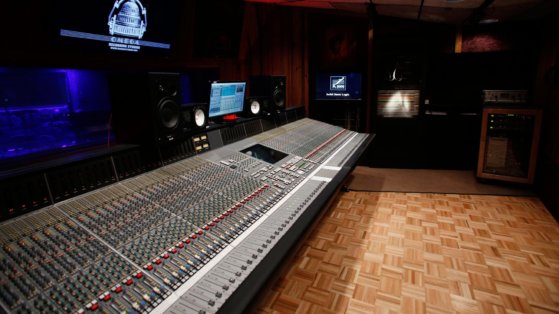
The reality is, you could buy the best gear in the world and still sound terrible. Remember that guy at the back of every music venue on the desk? Where is he in your studio?
What would your gigs sound like without someone on the mixing desk?

Recording is way more detailed and the quality level is significantly higher and more complex than a live mix.
In a live mix you have a combination the source that you can hear (music coming off stage), drums, amps etc… combined with music coming out of the front of house speakers.
In a studio recording, you don’t have any of the source, you’re only hearing what the microphones pick up.
For live bands in a recording studio, that means for example, often putting 12 microphones on a drum kit instead of when on a stage at a live venue, just mic’ing the kick and snare or for larger live venues, kick snare, overheads and toms.
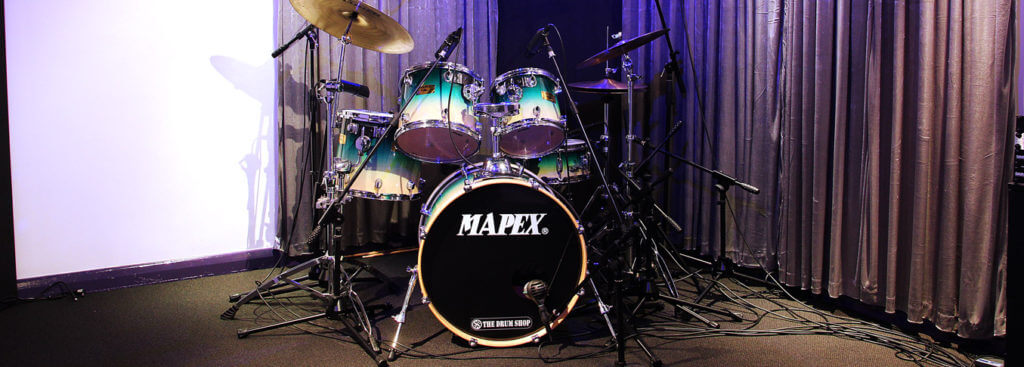
You might have a stereo pair of overheads, top and bottom snare mics, hi hat mic, kick drum in, kick drum out, hi-tom, mid-tom, floor-tom, left rear room mic, right rear room mic and we haven’t even mic’ed up the rest of a typical band yet. Then you have to mix all 12 mics together to make them sound like the one thing you heard live, the drum kit. That means EQing each sound to sound like the source in a way that will work in a mix with other instruments. We haven’t even got to the other instruments yet.
Electronic Instruments
Mixing Hip-Hop, R&B, Pop and Dance/EDM isn’t that much easier since you can often have 50 tracks or more to mix with each other and each sound often has to be punchy and big while still working with all the other sounds in the mix. Even if you buy a beat online, 99% of the time, that beat isn’t mixed and won’t hold up to commercially mixed tracks. Even if you’re working with pre-mixed loops, those loops aren’t taking into account the other sounds in your song. Each sound needs to be EQed, mixed and balanced against every other sound in the mix, not just individually.
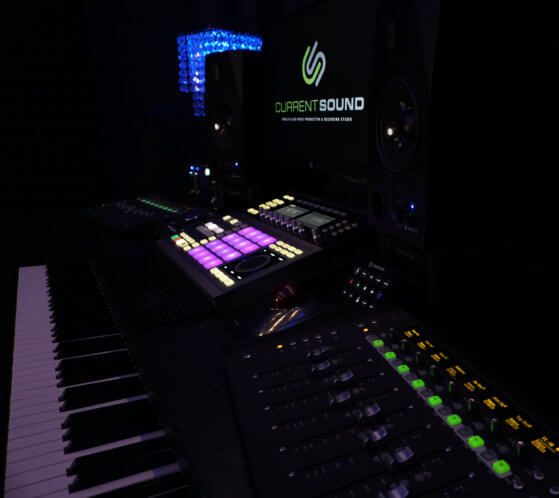
People Vs Gear
What a lot of musicians forget is that you’re just buying the gear. The gear is just one piece of the puzzle. It’s like if a kid who never played guitar before bought a 10k guitar. Then Jimmy Hendrix came along and had only a $100 guitar. Who do you think will sound better? The guitar doesn’t magically make the kid better.
Pretty soon after most people buy gear to start a home studio, they realize, their recordings don’t sound great. So what do they do…. They go and buy more gear lol. I just need a better mic. A new preamp. I just need some outboard gear.
Do you have G.A.S – Gear Acquisition Syndrome?
Buying more gear than you need is so common that there is even a name for it, Gear Acquisition Syndrome or G.A.S for short. For which Sweetwater conveniently to them claim there is no cure for lol. I disagree.
For those suffering with G.A.S for their home studio I’d say, try booking a professional recording studio without an engineer and see how it goes lol. Probably a cheaper life lesson than endlessly buying gear. Sound engineers have a saying that goes, “It’s not the gear, it’s the ear.”
What they really need to do, is learn how to mix and use what you have. The reality is, most engineers can create a great mix just using the stock plugins that come with the DAW. No matter how much gear you buy you are missing one crucial piece of gear that the professional recording studios have…. a talented recording engineer.
Why is the Home Recording Industry Booming?
Only a couple of decades ago it required a huge amount money to be able to record anything. You’d often have to spend 100k on gear alone not to mention the space required and the acoustics. Now, a Macbook, a cheap mic, interface, some studio monitors and you can start recording at home. So the bar to entry is low. I’ll be honest, the average person can learn to make great quality demo recordings at home. The keyword there is demo.
I Only Need a Demo… Right?
The Rise and Fall of Music Sales
Too many kids grown up watching old movies from the 90s. They see singers and rappers getting signed of a demo tape or crappy recording. That actually happened but at the same time the home studio revolution was happening, CD sales fell, piracy, mp3s, Napster and all that stuff caused music sales to drop dramatically. Instead of $30 for an album, people starting buying just the song they liked from the album for $1.99, if they didn’t download it illegally. Then streaming services came along and music sales went down further to only 0.006 of a cent per stream on Spotify.
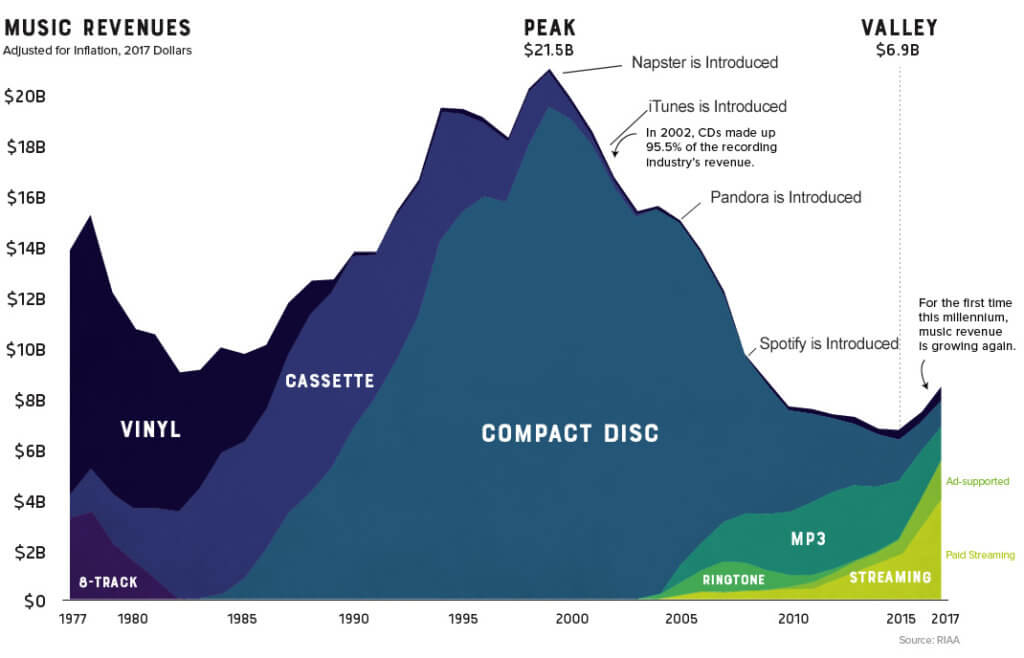
How the Major Labels Reacted
As a result, in the early 2000s, the major labels stopped offering Artist Development Deals. Those are the deals you saw in the movies. These days no one gets signed of talent alone.
To Get Signed – You Must Release and Promote Your Music Yourself
Even if your goal is to get signed, you have to promote yourself and build your fan base. That means creating a marketable product. That product is yourself as a brand and your music.
But I Like It! Other People will Like it Too!
Most musicians react based of emotion. I like it, it’s awesome, other people will like it too. Yes, perhaps but.. will they ever hear it? Will they buy it? Will they enjoy listening to it in the car, in the club on the radio? Or will it sound like a muffled mess?
Just because it sounds ok to you on your speakers doesn’t mean it will sound good to others on their system. A poorly mixed song doesn’t translate well to other systems.
The Influencers are Fussier Than You
DJs wont spin your song in the club if it doesn’t sound punchy and balanced or they’ll loose the dance floor
Spotify and Pandora playlist curators won’t put add a poorly mixed song to their playlist.
A radio station won’t play a poorly mixed song
Your Potential Fans are Fussier Than You
People won’t necessarily not listen to your song because it’s mixed badly but having it mixed badly means they might not like the song. The average person either likes a song or doesn’t like a song. They probably won’t be able to tell you why. However, if it’s lacking in clarity, doesn’t sound punchy, they can’t hear all the elements clearly, it sounds too quiet when played back with their other songs, the vocals are out of tune, the song is too long, the song is lacking in contrast, any of these things and many more can turn someone off your music.
The Next Missing Element Found in Some of the Top Recording Studios… The Music Producer
The advantage of having a music producer or going to a music producer operated recording studio is that the producer can help give you direction and help you deliver a better performance and suggest changes to improve your songs and make them more marketable.
Most major label artists work in the recording studio with a music producer. The studio might not necessarily be providing a music producer but regardless, for major label artists, a music producer is often present.
Since many musicians are recording their own music at home, their trying to be a sound engineer and also, a music producer.
What they often forget is by doing so, in the marketplace, they are competing against professionally mixed and produced songs.
Most people recording at home don’t know or understand what a music producer does. I’d suggest reading my article; What Does a Music Producer Do? Most of them also think they are a music producer now lol. Well despite whatever skill level you get to with that, here’s the main problem with producing yourself…
A Music Producer Always Has the Market in Mind and Knows What is Marketable.
A good music producer knows and understands the market trends. What works well for certain genres, for a nightclub, on radio etc…
Compared to the artist…
The Artist Wants to Fulfill Their Creative Vision as an Artist First. Regardless of the Market and What is Marketable
The truth is, there are very few artists on the radio and signed artists that produce themselves. Less than a handful. Pharell is the first one that comes to mind. Also there are a couple of DJ/Producers like Calvin Harris and David Guetta. The chances of you producing yourself and being successful is very slim.
So I Could Just Hire a Recording Engineer and a Music Producer to Come into My Home Studio?
Possibly but most of the freelance Music Producers and Sound Engineers these days have their own studios and often they charge a similar rate for working in someone else’s studio as they have to keep pay the overheads on their own studio regardless of whether or not they’re working in your home studio.
Small plug for my studio Current Sound which is a music producer owned recording studio, so you myself as a music producer and engineer with every session.
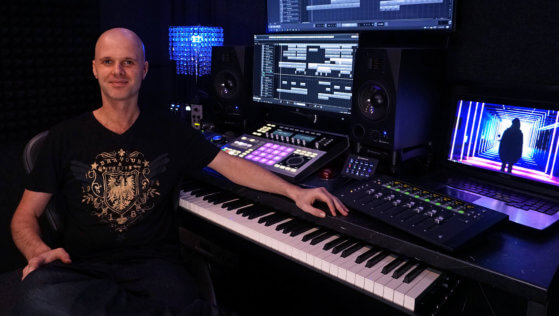
Aside From the People, Why Else Would I Need a Professional Recording Studio?
1. Space
Gear isn’t the only thing you need. Most home studio are lacking at least one or both of the following…
Isolation
If you don’t want to be recording birds, the UPS truck, nearby traffic, a loud car speeding past your place, your neighbors dog barking, other people inside your house or apartment complex you need isolation and sound proofing. Most home studios aren’t soundproofed properly. That means you’re not just recording yourself. You’re also recording the world around you.
Where the opportunities are, such as the big music cities in the US, people often live in apartments. Apartments in the US are usually all made out of drywall or if not, partitioned by drywall. Also, all houses and apartments have windows, doors and weak points. That means you’re going to get a lot of noise coming in and going out. Both annoying yourself and the people around you.
Acoustics
Most home studios aren’t acoustically treated and if they are, they’re often not treated properly which means you’re not just recording the source but also the room itself. It also means what you’re hearing on the monitors in your studio isn’t that accurate which would make it hard for even an experienced mix engineer to get a good mix that translates well over multiple systems let alone someone who is learning.
Size
Depending on what you’re wanting to do, size could be an issue. If you’re just recording vocals, you can do this in a regular sized room but if you want to record a full band, most likely they want to play together. It’s going to be hard to find a large enough room to fit an entire band in inside most houses. Placing a full band in an apartment with a drummer is a good way to get evicted pretty quickly.
2. Collaboration
When recording studios were booming, the most popular genre was rock.
These days turn on the radio and what you hear is all electronic music production.
When you’re in a band in a recording studio, you have other people to bounce ideas of. The musicians, those that wrote parts and contributed ideas. The music producer (if you hire one) giving the group suggestions. The sound engineer tuning the drums to a certain pitch, changing the tone of the amps, sculpting the sound and everyone vibing of each other and bouncing ideas back and forth.
When you’re at home, if you do work with others you might be bringing people in one at a time or if you’re a rapper or singer, you’re probably just leasing a beat online and putting whatever you can make fit over the top without the beat-maker and/or producer being able to make the music fit better to your idea.
The act of vibing with other experts in the instrument is gone. Often people are also writing their part alone.
Major Label Artists Have Collaborators
Major labels artists are busy in the big recording studios working with songwriters, music producers, session musicians while you’re just sitting in your home studio thinking you can take on the best in the business in all of their fields by yourself.
How many artists do you think are that wrote, produced, recorded, mixed and mastered all of their own songs? I’ll tell you, there are less than a handful in the world. But how many artists are there that think they can do it themselves? Pretty much every person with a home studio lol.
Can Unsigned Artists Get Collaborators from the Recording Studio?
The interesting thing is, even though major label artists are using professional studios for collaboration, the studio is not the one providing these people. They often have an in house engineer but that’s about it. It’s actually the record label that are providing these people.
Finding Collaborators…
Finding Music Producers
However, in each city, there are usually a handful of music producers (yes you read that correctly, 5 or less) that are available for hire that are of a high skill level. There are millions of beat-makers who use the name music producer incorrectly and lack most of the skills of a music producer but very few actual music producers in each city that are available for hire and have a deep understanding of music theory, market trends and the ability to direct the artist to get their best performance and create a marketable song.
Producer Owned & Operated Studios
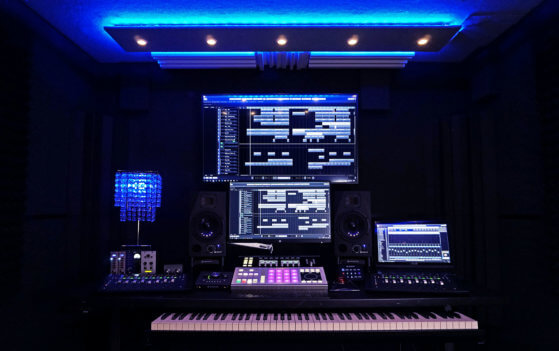
These guys often have their own recording studio so asking around and even just googling for “music producer recording studio near me” is a good start. If you’re in LA, you’re already on the website for one. So you can start by checkout my recording studio in Hollywood, Los Angeles here.
Finding Session Musicians & Session Vocalists
If you’re working with a music producer, they can probably find these people for you but it’s not so hard to find them yourself. You can try putting up flyers at your local music store or bars that musicians play at and frequent. Or if you’re in a big city it’s probably as easy as putting an add on Craigslist. Musicians are often looking for extra cash. Putting up an add for paid session work at $50 an hour usually gets interest. Less than that, you’re less likely to get talent.
Finding Songwriters
This is probably the hardest one. You can find people who write for others online but finding them in person is difficult. Often songwriters are either not talented enough or are so talented that they can’t be bothered working with unsigned artists or if they do, they charge too much.
Word of mouth plays a big part here. Unfortunately most songwriters that are available for hire can’t be found very easily but if you find an independent artist that has an amazing song, reach out and see if they wrote it or can put you in touch with their writers.
This is one area where the labels have the upper hand as they’re always asking music publishers for songs for certain artists. You’d have to have a pretty huge fan base to be able to go to a music publisher and ask them to get someone to write a song for you.
Songwriters usually don’t come with a professional recording studio anyway but aside from rappers, most famous singers don’t write their own songs. I have a few very talented songwriters available for hire here though Current Sound but they’re also a little fussy as to who they will work with.
3. Gear
Of course, professional recording studios have great gear, often way in excess of what you could afford to buy at home. In saying that, the gap between the home studio market and pro studio market keeps getting smaller. Still, you will most likely get a bump in quality from their gear alone. Also due to the fact that the sound engineer will be able to audition different mics to suit different singers and choose the right gear for the right application.
Summary
The skills of the sound engineer plus the combination of the isolation, acoustics and gear of a professional recording studio will give you a far greater quality than you can achieve yourself at home. This goes for most large recording studios and mid-priced studios.
Even if you buy all the gear in the world, it’s likely you’ll still need a professional recording studio for the simple fact that, that’s where the professional sound engineers work from.
The main difference between a very serious home recording studio and a professional recording studio is probably going to be the skill set of the sound engineer. The difference between the end product based on that skill set is drastic.
When Hiring a Professional Recording Studio with a Sound Engineer
The crucial factor that tends to vary the most, in the professional level, is the the skill of the sound engineer.
When you hire a studio, you’re paying for the engineer to help you sound amazing.
So you have to be careful when finding a recording studio with an engineer in the mid-priced category, even in the high-priced category to make sure that the sound engineer can deliver and give you what you need. Listen to their previous recordings and mixes. What genres and styles can they nail the mix of? For example, a guy who mixes mainly rock bands on an old analogue desk might not be the best guy to mix your EDM track.
Moving Up a Level
If you start to look towards Music Producer Recording Studios once you factor in a music producer and collaborators (session musicians, songwriters), you’re now getting closer towards making a marketable product that will give you a greater chance of success.
Given that artists these days don’t get signed until they’re already successful, it makes sense to make a marketable product. Also, the more marketable a product is, the cheaper it is to advertise and higher the chance of getting the exposure you need.
I’ve literally produced songs that only cost $1 to market lol. Maybe less. I remember producing a song back in 2005 and handing it to just one DJ I knew on CD. That DJ started playing it and the crowds started going crazy. Then other DJs wanted to play it so they asked him for a copy. Soon it was passed around and all the DJs in the city were playing it. Some of those people worked in radio. It made it onto high rotation on radio and then charted to number 1 on the charts.
I admit that is not normal, it usually costs more to market a song but my point is, the more marketable your song is, the higher the chance of influencers picking it up and the higher the chance of growing your fan base.
So instead of trying to completely avoid going to a professional studio because ‘you can record at home’ maybe think about creating a marketable song instead. Instead of spending money marketing a sub-standard recording.
Should You Make a Home Recording Studio?
Yes. I know you were thinking by the tone of this article that I was going to say no but actually, you should totally make your own home recording studio.
Why? For songwriting.
Writing in a recording studio under pressure is difficult. The more you can write at home the better. Sure it would be ideal to bounce ideas back in and forth in a recording studio but lets face it. Most independent musicians are busy and work a side job these days.
Being able to write at home is convenient. Given that it’s so cheap to setup a very basic home studio, you may as well have a space to write in, in your down time.
Soon though, you’re going to come to the realization that, in order to create a professional sounding song and marketable product, you’re going to need to take that song that you’ve written and book some time in a professional recording studio so you can hire an engineer, use hand picked specific gear for you in an isolated and acoustically treated space. Even if you get extremely good at the recording side at home and have killer gear, you’ll still need to take that song into a studio to be mixed and mastered.
Or for Tracking/Recording
A lot of voice over artists have serious home studio setups for recording voice overs for commercials.
With the internet these days, professional studios can record and mix you remotely using software like Source Connect and VST Connect. This has become fairly common in post production studios for commercials.
The advantage of doing voice over work is that the post production agency will handle the mixing for you. So you don’t have to spend years learning to mix.
This requires a more serious home recording setup than most artists have but if you’re good at it, you can earn decent money doing it.
If you have the cash and you’re tech savvy, you could make a serious home recording/tracking studio space to record at home and send the files to a professional mixing and mastering engineer like myself. It’s not cheap to setup though and requires a steep learning curve but of course it’s not impossible.
How Do You Find a Good Recording Studio, Mixing & Mastering Engineers and Music Producers?
Finding a Recording Studio & Sound Engineer
You might be interested in reading my article on recording studio types first. There are different studios for different types of music and your needs. Once you work out what type you need, you can start searching from there.
Because the bar to entry of starting a home studio is low, the mid-priced category is probably the hardest to way to find a talented sound engineer. You really have to listen to their work and do your homework. In saying that, there are also some talented sound engineers with very serious home studios. Even the mid-priced recording studio market is a little sketchy. Some studios have amazing engineers. Others have very average or sub-par ones. That is the downside for it being cheaper to start a recording studio. Anyone can write some credits on a website. I’d highly suggest listening to the previous work of the engineer who is actually going to be doing your session since that’s one of the main reasons of going to a recording studio in the first place.
This and more is covered in my recording studio types article.
Freelance sound engineers often have their own home studio or commercial studio where they work from these days.
Finding a Mastering Studio
Mastering is often unattended so there are lots of online mastering studios but I will say, 99.99 percent of the time that I’m asked by a home studio guys who think they can mix their own music to master their ‘mix’ it’s not ready for mastering and needs to be mixed properly first.
The studio where you record and mix might also do mastering. Again, listen to their work first.
Finding a Music Producer
I have a whole article on that here; How to find a Music Producer.
If You Found This Useful, Please Share it
If you enjoyed this article, please do me a small favor and share it on social media using one of the icons below. For those in Los Angeles, you can checkout my recording studio in Hollywood here.
If you didn’t like this article and think it doesn’t apply to you, you can comment below, post your music and see what other people have to say about it.
